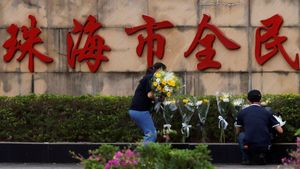Donald Trump, the former U.S. president, made headlines recently as he returned to Washington, D.C., marking what many view as a significant political comeback after stepping down four years ago. His visit, which has stirred discussions on various platforms, saw him meeting with House Republicans and hinting at another presidential run. The atmosphere was palpable as Republicans gave him a warm welcome, largely fueled by the excitement surrounding wider GOP control after recent elections.
During his time in Washington, Trump was spotted mingling with Republican lawmakers, discussing strategies and policies relevant to his potential future ambitions. His return isn’t just about personal ambition; it's also seen as pivotal for the Republican Party as they look to consolidate their power. Trump's influence on the GOP remains strong, and his re-emergence has turned heads within both party lines and the broader political atmosphere.
Meanwhile, politics is heating up on another front, with Trump's anticipated tariff policy looming large. Sources confirm Trump is finalizing preparations to re-implement significant tariffs, which he views as central to enhancing American production. The rumored appointment of Robert Lighthizer, who previously served as the U.S. Trade Representative, as his "Trade Czar" indicates Trump’s commitment to making these tariffs substantial rather than merely symbolic.
Lighthizer has had a direct hand in crafting Trump’s trade strategy before, working as the key architect behind what became known as the "tariff bomb." Under his leadership, prior tariffs were intended to increase domestic production, but critics have consistently raised alarms about their long-term economic impact. According to Politico, Lighthizer's team is working on detailed plans to roll out their approach swiftly, potentially within the first 100 days of Trump's new term.
Reports indicate there’s already been pushback from other nations. For one, Mexico’s Economy Minister warned of potential countermeasures should Trump impose hefty tariffs. Similar responses have been noted from Japan and the U.K., reflecting concerns about the broader ramifications of Trump's trade tactics not just on U.S. soil but globally as well.
Critics point to studies predicting substantial adverse effects on the U.S. economy, with estimates citing potential losses upwards of $700 billion if trading partners retaliate with their tariffs. Neel Kashkari, the president of the Federal Reserve Bank of Minneapolis, warned about inflation risks tied to these policies—suggesting they could lead to immediate price hikes and even prolonged inflation spikes if the trade wars escalate.
Hence, Trump's planned tariffs set up not only domestic economic debates but also international tensions. The diplomatic conversations among nations underscoring potential responses to U.S. tariff measures signify the complex geopolitical dynamics Trump’s policies could stir. Despite this, Trump's ardent supporters continue to rally behind the idea of protectionist measures as key to boosting domestic industries—a sentiment he echoed during his campaign.
With all this activity and anticipation swirling, the question arises: how firm is Trump’s grip on Republican politics? Even as he charts this new course, the question of unity within the party hangs over the GOP like dark clouds. Trump’s followers have remained loyal, but fissures exist within the party as they grapple with differences between the Trump-centric loyalists and more moderate factions. The balancing act will be pivotal as Trump presses forward with his agenda.
This political chess match is not just about Trump; it’s also about how he navigates the complicated party dynamics and external pressures to assert his policies effectively. His return is more than personal revival; it’s shaping up to be about the future direction of the Republican Party as it gears up for future elections.
All eyes will be on Trump as he maneuvers through these challenges, strategically engaging his political allies and addressing potential criticisms, both domestically and internationally. Will this return solidify his influence or expose vulnerabilities within the party? Time will tell as he sets his agenda and positions himself for what many anticipate will be another spirited run for the presidency.



